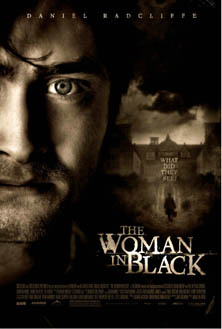
Starts 29 March
Original language: English
 James Watkins molds Susan Hill’s 1983 supernatural/psychological novel by the same name, with a screenplay from Jane Goldman, in to a worthwhile celluloid ghost story. A nicely matured Daniel Radcliffe, playing the young lawyer Arthur Kipps, captures the emotionality attributed to loss and sorrow, as well as the desire to do right by a four-year-old son Joseph (Misha Handley) following the untimely death of wife Stella (Sophie Stuckey). The opening credit sequence establishes the gothic atmosphere, as signs emerge of that yet to come.
James Watkins molds Susan Hill’s 1983 supernatural/psychological novel by the same name, with a screenplay from Jane Goldman, in to a worthwhile celluloid ghost story. A nicely matured Daniel Radcliffe, playing the young lawyer Arthur Kipps, captures the emotionality attributed to loss and sorrow, as well as the desire to do right by a four-year-old son Joseph (Misha Handley) following the untimely death of wife Stella (Sophie Stuckey). The opening credit sequence establishes the gothic atmosphere, as signs emerge of that yet to come.
Kipps is sent to a remote village by his London law firm to ascertain that theirs is the final will for the Marsh estate, with the warning the firm “can’t carry passengers”—their indulgence in his grief is over. During his train journey, flashbacks give us more clues. Fellow train passenger Daily (Ciarán Hinds) offers a lift to the local Inn, and a dinner invitation for the next evening. At the Inn the proprietors’ (Shaun Dooley, Mary Stockley) claim there are no rooms, even though his firm booked in advance, and every possible contrivance is made against his staying. In the morning when Kipps goes to local solicitor Mr. Jerome, the townsfolk shun him, and the Jeromes’ (Tim McMullan, Cathy Sara) reiterate he should return posthaste to London. But, he knows this is his last chance to prove himself.
At the lonely Marsh estate, accessible through a bog only during low tide, Kipps’s focus on reading the score of pertinent papers is interrupted by… a figure in the garden that disappears upon his approach, a shadow scurrying across the wall that has no source, doors unlocking themselves and musical toys playing at whim. Mrs. Daily (Janet McTeer) avers to the ghost of a woman clad in black, and more, before collapsing whist dining. It takes spending a night at the dilapidated manor for Kipps to fathom the details surrounding scorned Alice, including the extent of this spirit’s vengeful wrath. Try as he does to appease, the seed of doom has been sown.
Central to the suspenseful impact of The Woman in Black (yes, I jumped in my seat at least twice) is Tim Maurice-Jones’s cinematography, Jon Harris’s editing, and Marco Beltrami’s original music. Production designer Kave Quinn, with Paul Ghirardani’s art direction and Niamh Coulter’s set decoration, aesthetically imbue the tale in gloom and fog, essential to any good gothic ghost story. Conventionally well told and fearsome without being exaggerated, this film is a nice respite from horror flicks that rely solely on blood and guts to produce some sort of an effect.
